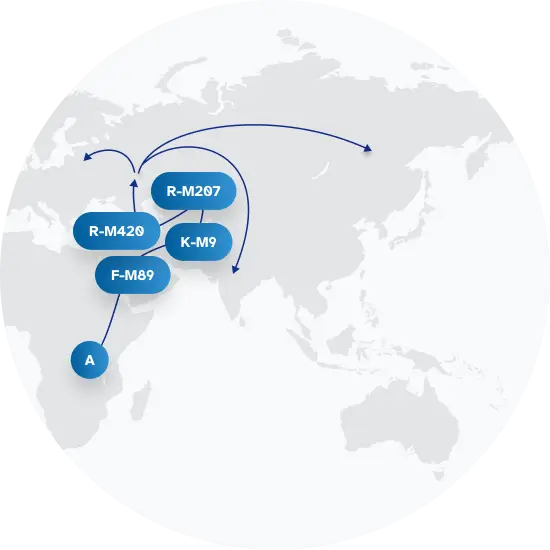Explore the Family Name Pickering
How common is the last name Pickering in the United States?
Based on the Decennial U.S. Census data, the popularity of the surname Pickering has seen a slight decrease in rank from 2,519 in 2000 to 2,653 in 2010, indicating a change of -5.32%. However, the actual count of individuals carrying this surname surprisingly increased by 3.25%, with a total of 13,154 in 2000 and rising to 13,582 in 2010. The proportional representation per 100,000 people also fell slightly from 4.88 to 4.6, marking a 5.74% drop.
| 2000 | 2010 | Change | |
|---|---|---|---|
| Rank | #2,519 | #2,653 | -5.32% |
| Count | 13,154 | 13,582 | 3.25% |
| Proportion per 100k | 4.88 | 4.6 | -5.74% |
Race and Ethnicity of people with the last name Pickering
In terms of ethnic identity, the census data reveals some shifts between 2000 and 2010. The proportion of those with Pickering as their surname identifying as Asian/Pacific Islander rose by 38.46%, while those identifying as having two or more ethnicities saw an increase of 25.69%. The percentage of individuals identifying as White decreased slightly by 2.78%, although they still made up the majority at 87.56%. The Hispanic population among Pickerings experienced the largest growth at 50.28%, while the Black community marked an increase of 20.45%. Meanwhile, those identifying as American Indian and Alaskan Native saw a small decrease of 5.49%. It's important to note that this data is based on the Decennial U.S. Census and may not fully capture all changes in ethnicity over time.
| 2000 | 2010 | Change | |
|---|---|---|---|
| White | 90.06% | 87.56% | -2.78% |
| Black | 5.28% | 6.36% | 20.45% |
| Hispanic | 1.79% | 2.69% | 50.28% |
| Two or More Races | 1.44% | 1.81% | 25.69% |
| American Indian and Alaskan Native | 0.91% | 0.86% | -5.49% |
| Asian/Pacific Islander | 0.52% | 0.72% | 38.46% |
Pickering ancestry composition
23andMe computes an ancestry breakdown for each customer. People may have ancestry from just one population or they may have ancestry from several populations. The most commonly-observed ancestry found in people with the surname Pickering is British & Irish, which comprises 56.1% of all ancestry found in people with the surname. The next two most common ancestries are French & German (24.0%) and Eastern European (4.5%). Additional ancestries include Scandinavian, Spanish & Portuguese, Italian, Ashkenazi Jewish, and Nigerian.
Ready to learn more about your ancestry? Get the most comprehensive ancestry breakdown on the market by taking our DNA test. Shop 23andMe
| ANCESTRY BREAKDOWN | COMPOSITION |
|---|---|
| British & Irish | 56.1% |
| French & German | 24.0% |
| Eastern European | 4.5% |
| Other | 15.4% |

Possible origins of the surname Pickering
Your DNA provides clues about where your recent ancestors may have lived. Having many distant relatives in the same location suggests that you may all share common ancestry there. Locations with many distant relatives can also be places where people have migrated recently, such as large cities. If a large number of individuals who share your surname have distant relatives in a specific area, it could indicate a connection between your surname and that location, stemming from either recent ancestral ties or migration.
Based on 23andMe data, people with last name Pickering have recent ancestry locations all within the United Kingdom of Great Britain and Northern Ireland.
| RECENT ANCESTRY Location | Percentage |
|---|---|
| West Midlands, United Kingdom | 86.50% |
| Greater London, United Kingdom | 86.50% |
| Greater Manchester, United Kingdom | 86.50% |
| Tyne And Wear, United Kingdom | 86.30% |
| Merseyside, United Kingdom | 86.00% |
What Pickering haplogroups can tell you
Haplogroups are genetic population groups that share a common ancestor on either your paternal or maternal line. These paternal and maternal haplogroups shed light on your genetic ancestry and help tell the story of your family.
The top paternal haplogroup of people with the surname Pickering is R-M420, which is predominantly found among people with European ancestry. Haplogroup R-M420 is descended from haplogroup R-M420. Other common haplogroups include R-FGC15710 and R-CTS241, which are predominantly found among people with European and European ancestry. Other surnames with similar common haplogroups are: Hays, Yeager, Hay, Hayes, Grace, Edwards, Nicholas, Davis, Holloway, Allen.
The most common maternal haplogroups of people with Pickering surname are: H1, T2b, H. These most commonly trace back to individuals of European ancestry.
 Paternal Haplogroup Origins R-M420
Paternal Haplogroup Origins R-M420
Your paternal lineage may be linked to Mal'Ta Boy
Buried with a variety of trinkets including an ivory crown and stone-hewn figurines, “Mal'Ta Boy” was a freckled three-year-old who lived 24,000 years ago near Lake Baikal in Siberia. Although Mal'Ta Boy's life was cut short by unknown circumstances, his genome contains important clues about the ancestors of modern Native Americans.From Mal'Ta Boy's bone samples, researchers determined that he carried paternal haplogroup R, an ancient lineage that is still relatively common in Western Europe, Central Asia, and South Asia. One striking discovery was that Mal'Ta Boy's genome showed affinities with both modern European and Native American populations, but not with modern East Asians. This suggests present-day Native Americans are likely descended from at least two source populations: one originating in East Asia and the other closely related to Mal'ta boy's Central Siberian roots.
Your maternal lineage may be linked to Marie Antoinette
Because it is so dominant in the general European population, haplogroup H also appears quite frequently in the continent's royal houses. Marie Antoinette, an Austrian Hapsburg who married into the French royal family, inherited the haplogroup from her maternal ancestors. So did Prince Philip, Duke of Edinburgh, whose recorded genealogy traces his female line to Bavaria. Scientists also discovered that famed 16th century astronomer Nicolaus Copernicus traced his maternal lineages to haplogroup H.

What do people with the surname Pickering have in common?
Spoiler alert: it's complicated. People with the same last name are usually no more genetically similar than a randomly sampled group of people from the same population. That said, people with the same surname are more likely to have similar ancestries than randomly sampled individuals. The reason is the tendency of people with similar cultural or geographical backgrounds to preferentially mate with one another. That's why people who share a surname may be more likely to share traits and tendencies in common than people within the general population. Check out the percentages below to see the prevalences of tastes, habits, and traits of people with your surname compared with prevalences among 23andMe users.
Preferences
Traits
Habits
Wellness
Are health conditions linked to the last name Pickering?
The short answer is that, if there is an association between surname and health, it's usually more about your ancestry than your name. Individuals with a given surname are no more genetically similar than the general population but often have similar ancestries. The populations of people associated with those shared ancestries often have sets of genetic variations, also known as alleles, in common. Some of those alleles are associated with a greater likelihood of developing certain diseases.
Disease variant frequency by ancestry
Disease allele frequencies in populations associated with the surname Pickering are shown below. Important Note: not everyone with a disease allele will develop these health condition






















